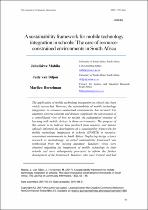 ResearchSpace
ResearchSpace
A sustainability framework for mobile technology integration in schools: The case of resourceconstrained environments in South Africa
JavaScript is disabled for your browser. Some features of this site may not work without it.
- ResearchSpace
- →
- Research Publications/Outputs
- →
- Journal Articles
- →
- View Item
| dc.contributor.author |
Mabila, J

|
|
| dc.contributor.author |
van Biljon, J

|
|
| dc.contributor.author |
Herselman, Martha E

|
|
| dc.date.accessioned | 2017-10-30T08:47:27Z | |
| dc.date.available | 2017-10-30T08:47:27Z | |
| dc.date.issued | 2017-10 | |
| dc.identifier.citation | Mabila, J., van Biljon, J and Herselman, M. 2017. A sustainability framework for mobile technology integration in schools: The case of resourceconstrained environments in South Africa. Journal of Community Informatics, vol. 13(2): 59-86 | en_US |
| dc.identifier.issn | 1721-4441 | |
| dc.identifier.uri | http://ci-journal.net/index.php/ciej/article/view/1385 | |
| dc.identifier.uri | http://hdl.handle.net/10204/9696 | |
| dc.description | Article published in Journal of Community Informatics, vol. 13(2): 59-86 | en_US |
| dc.description.abstract | The application of mobile technology integration in schools has been widely researched. However, only a few studies have extensively examined the sustainability of mobile technology integration in resource-constrained environments. Diverse contexts and devices complicate the construction of a consolidated view of how to sustain the pedagogical practice of learning with mobile devices in these environments. The purpose of this article is to indicate how feedback from teachers and district officials informed the development of a sustainability framework for mobile technology integration in schools (SFMTIS), which originated following a literature review. Employing design science research as methodology, a sustainability framework was synthesized from the existing literature. Teachers’ views were obtained regarding the integration of mobile technology in their schools and were subsequently processed to inform the further development of the framework. Teachers who had previously participated in an initiative which introduced mobile tablet use, trained those teachers, and provided information and communication technology infrastructure to their schools, were purposively selected for the study. Department of Basic Education officials based at district offices were also interviewed for their views on sustainable integration. The findings form the basis for the proposed SFMTIS in resource-constrained environments in South Africa. Besides the refined sustainability framework, the research contributes novel insights into the differing perspectives of the teachers and the district officials, and how those can impact the sustainability of mobile technology integration in resource-constrained environments. | en_US |
| dc.language.iso | en | en_US |
| dc.publisher | CCIRDT | en_US |
| dc.relation.ispartofseries | Worklist;19632 | |
| dc.subject | Information and communication technology for development | en_US |
| dc.subject | ICT4D | en_US |
| dc.subject | Sustainability framework for mobile technology integration in schools | en_US |
| dc.subject | SFMTIS | en_US |
| dc.title | A sustainability framework for mobile technology integration in schools: The case of resourceconstrained environments in South Africa | en_US |
| dc.type | Article | en_US |
| dc.identifier.apacitation | Mabila, J., van Biljon, J., & Herselman, M. E. (2017). A sustainability framework for mobile technology integration in schools: The case of resourceconstrained environments in South Africa. http://hdl.handle.net/10204/9696 | en_ZA |
| dc.identifier.chicagocitation | Mabila, J, J van Biljon, and Martha E Herselman "A sustainability framework for mobile technology integration in schools: The case of resourceconstrained environments in South Africa." (2017) http://hdl.handle.net/10204/9696 | en_ZA |
| dc.identifier.vancouvercitation | Mabila J, van Biljon J, Herselman ME. A sustainability framework for mobile technology integration in schools: The case of resourceconstrained environments in South Africa. 2017; http://hdl.handle.net/10204/9696. | en_ZA |
| dc.identifier.ris | TY - Article AU - Mabila, J AU - van Biljon, J AU - Herselman, Martha E AB - The application of mobile technology integration in schools has been widely researched. However, only a few studies have extensively examined the sustainability of mobile technology integration in resource-constrained environments. Diverse contexts and devices complicate the construction of a consolidated view of how to sustain the pedagogical practice of learning with mobile devices in these environments. The purpose of this article is to indicate how feedback from teachers and district officials informed the development of a sustainability framework for mobile technology integration in schools (SFMTIS), which originated following a literature review. Employing design science research as methodology, a sustainability framework was synthesized from the existing literature. Teachers’ views were obtained regarding the integration of mobile technology in their schools and were subsequently processed to inform the further development of the framework. Teachers who had previously participated in an initiative which introduced mobile tablet use, trained those teachers, and provided information and communication technology infrastructure to their schools, were purposively selected for the study. Department of Basic Education officials based at district offices were also interviewed for their views on sustainable integration. The findings form the basis for the proposed SFMTIS in resource-constrained environments in South Africa. Besides the refined sustainability framework, the research contributes novel insights into the differing perspectives of the teachers and the district officials, and how those can impact the sustainability of mobile technology integration in resource-constrained environments. DA - 2017-10 DB - ResearchSpace DP - CSIR KW - Information and communication technology for development KW - ICT4D KW - Sustainability framework for mobile technology integration in schools KW - SFMTIS LK - https://researchspace.csir.co.za PY - 2017 SM - 1721-4441 T1 - A sustainability framework for mobile technology integration in schools: The case of resourceconstrained environments in South Africa TI - A sustainability framework for mobile technology integration in schools: The case of resourceconstrained environments in South Africa UR - http://hdl.handle.net/10204/9696 ER - | en_ZA |





